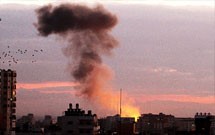 Israel on Wednesday launched the biggest military operation in the Gaza Strip since Operation Cast Lead in late 2008. Israeli airstrikes killed Ahmed al-Jabari, the chief of the Izz al-Deen al-Qassam Brigades, the military wing of Hamas, the Palestinian Islamist movement that rules the Palestinian territory. Israeli warplanes also struck other Hamas military leaders and attacked facilities that housed the group's arsenal of longer-range rockets and
Israel on Wednesday launched the biggest military operation in the Gaza Strip since Operation Cast Lead in late 2008. Israeli airstrikes killed Ahmed al-Jabari, the chief of the Izz al-Deen al-Qassam Brigades, the military wing of Hamas, the Palestinian Islamist movement that rules the Palestinian territory. Israeli warplanes also struck other Hamas military leaders and attacked facilities that housed the group's arsenal of longer-range rockets and
missiles.
Israel Defense Forces are also preparing for a potential ground offensive, but the country's political leaders say that such a move will depend on Hamas' intentions. Even as it escalates its military actions, Israel is clearly trying to avoid a repeat of Operation Cast Lead. That operation took place before widespread regional unrest unseated a number of Arab rulers who were in a position to subdue their countries' citizens.
Egypt, the region's most critical state as concerns Israel's security, best illustrates the changed political landscape around Israel. President Mohammed Morsi is a senior member of the world's oldest and largest Islamist movement, the Muslim Brotherhood; Hamas is the successor to the Brotherhood's Palestinian branch. Israel is already struggling to manage the rise of Islamists in the wake of the demise of secular Arab autocrats. It certainly doesn't want to exacerbate its difficulties with an offensive in Gaza.
That said, Israel won't tolerate rocket fire from Gaza -- especially expanded rocket capability in the form of the Fajr 5, a new long-range missile that the Israelis claim to have targeted in their airstrikes. Israel has to take action to protect its citizenry. It needs to make sure that the Arab Spring allows neither Hamas nor other, more radical factions in Gaza connected to al Qaeda or Iran to become capable of threatening Israeli security.
Hamas also has no interest in picking a fight with Israel, especially after Cast Lead, which devastated the Palestinian territory and Hamas. On the contrary, Hamas wishes to benefit from the Arab Spring in the same way its Muslim Brotherhood comrades in Egypt have. Ultimately, Hamas wishes to be recognized internationally as a legitimate political entity ruling the Gaza strip.
Hamas would like to use the Arab Spring and the decline of its secular rival Fatah as springboards to emerge as the vanguard of Palestinian nationalism. But even as it seeks to enter the political mainstream, Hamas must contend with fundamental geopolitical realities -- including the fact that it does not have a monopoly over violence in the Gaza Strip.
Hamas' rival factions run the gamut from the pro-Iranian Palestinian Islamic Jihad to Salafist-Jihadist groups linked to an al Qaeda-inspired agenda. All these groups seek to undermine Hamas' influence. What will happen is this: Rival Palestinian factions will stage rocket attacks. This may happen with the assistance of hawkish elements of Hamas who do not agree with the leadership's agenda. This will create a dilemma for Hamas.
On one hand, Hamas doesn't wish to engage Israel militarily. But on the other, it cannot always remain constrained in the face of Israeli countermeasures. Hamas rules Gaza but lacks the ability to control the area's different factions, which means that, like it or not, a potential war with Israel is on the horizon.
Courtesy : Stratfor (www.stratfor.com)